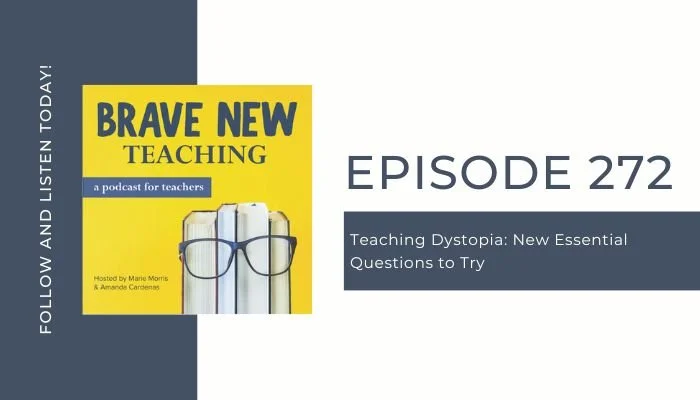TEACHING DYSTOPIA: New Essential Questions to Try [S7 EP. 272]
Listen to the full episode below:
Ready to shake up how you teach dystopia? In this episode, we dig into why this genre still thrills us and how to keep it feeling fresh, relevant, and totally irresistible for students. We’re not just talking about the same old “Is America a dystopia?” debate!
We’re pushing into new territory, brainstorming essential questions that reflect our ever-changing world (and the new books showing up on classroom shelves). If you love geeking out about inquiry-driven lessons and crave a little friendly chaos, you’re in the right place.
This week is the kickoff to our three-part dystopia extravaganza, and we’re focusing on structure and new essential questions. Using our signature trifecta - text, theme, and skills - we share how to build essential questions that go beyond surface-level thinking.
Think: What happens after the revolution ends? What does it mean to rebuild a world that’s been broken? And how does analyzing patterns in dystopian fiction help students wrestle with those big, real-life questions as they come of age and prepare to shape the world themselves? We totally nerd out bouncing ideas off each other, and hope you’re talking it out with us too!
Don’t worry, we’re saving the deep-dive details and juicy examples for the rest of the series, so there’s plenty more to look forward to. Next time, we’re getting into the specific skills you can target within dystopian units, and after that, we’ll hand over a fresh list of texts and ideas to fuel your own classroom experiments. Whether you’re a dystopia fan or just want to help students feel invested, this episode will leave your brain buzzing and your pen flying with new possibilities!
topics discussed:
Reasons for updating and refreshing dystopia units to reflect current events, new texts, and the changing world
Approaching the teaching of dystopia with inquiry and the power of using strong, thought-provoking essential questions
The benefits of shifting essential questions away from an America-centric focus to more global or universal perspectives on dystopian societies
Exploring the concept of post-apocalyptic and “rebuilding” themes in dystopian texts and how these can deepen critical thinking
The process of crafting effective essential questions by blending text, theme, and skill objectives for a sustainable, engaging unit
The importance of vertical alignment in genre study, scaffolding dystopian analysis across grade levels to promote growth and maturity in student thinking
resources:
Free Training: Down with the Reading Quiz
Follow Marie on Instagram: @wellhelloitsmarie
Follow Amanda on Instagram: @mudandinkteaching
Let us know what you think! Leave a review on Apple Podcasts.
check out other bnt episodes:
Episode 171, New Dystopian Texts & Supplements for Your ELA Classroom
Episode 259, Teaching the Hero’s Journey: A Fantasy Choice Unit Approach for 11-12 Grade ELA
More about Brave New Teaching:
Join hosts Amanda Cardenas (Mud & Ink Teaching) and Marie Morris (The Caffeinated Classroom) in discussions about being brave, trying new things, and all things teaching! As seasoned classroom teachers, Amanda and Marie bring their experience, insight, energy, and oh, so many opinions and ideas... It's time for all teachers to take their classroom and teaching practice into their own hands!
Tune in on your favorite podcast apps like Apple Podcasts, Google Podcasts, and Spotify.
